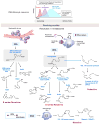Proresolving lipid mediators and mechanisms in the resolution of acute inflammation
- PMID: 24656045
- PMCID: PMC4004957
- DOI: 10.1016/j.immuni.2014.02.009
Proresolving lipid mediators and mechanisms in the resolution of acute inflammation
Abstract
Inflammatory responses, like all biological cascades, are shaped by a delicate balance between positive and negative feedback loops. It is now clear that in addition to positive and negative checkpoints, the inflammatory cascade rather unexpectedly boasts an additional checkpoint, a family of chemicals that actively promote resolution and tissue repair without compromising host defense. Indeed, the resolution phase of inflammation is just as actively orchestrated and carefully choreographed as its induction and inhibition. In this review, we explore the immunological consequences of omega-3-derived specialized proresolving mediators (SPMs) and discuss their place within what is currently understood of the role of the arachidonic acid-derived prostaglandins, lipoxins, and their natural C15-epimers. We propose that treatment of inflammation should not be restricted to the use of inhibitors of the acute cascade (antagonism) but broadened to take account of the enormous therapeutic potential of inducers (agonists) of the resolution phase of inflammation.
Copyright © 2014 Elsevier Inc. All rights reserved.
Figures



References
-
- Aronoff DM, Canetti C, Peters-Golden M. Prostaglandin E2 inhibits alveolar macrophage phagocytosis through an E-prostanoid 2 receptor-mediated increase in intracellular cyclic AMP. J Immunol. 2004;173:559–565. - PubMed
-
- Aronoff DM, Carstens JK, Chen GH, Toews GB, Peters-Golden M. Short communication: differences between macrophages and dendritic cells in the cyclic AMP-dependent regulation of lipopolysaccharide-induced cytokine and chemokine synthesis. J Interferon Cytokine Res. 2006;26:827–833. - PubMed
-
- Aronoff DM, Peres CM, Serezani CH, Ballinger MN, Carstens JK, Coleman N, Moore BB, Peebles RS, Faccioli LH, Peters-Golden M. Synthetic prostacyclin analogs differentially regulate macrophage function via distinct analog-receptor binding specificities. J Immunol. 2007;178:1628–1634. - PubMed
Publication types
MeSH terms
Substances
Grants and funding
LinkOut - more resources
Full Text Sources
Other Literature Sources
Medical

